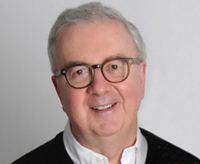Jim Corgel ’73 is currently general manager of independent software vendor and developer relations at IBM Corporation, where he has worked for 36 years. During a recent visit to campus, the American Studies major, who later also received an MBA from the University, shared his thoughts on the value of a liberal arts education from Notre Dame.

College of Arts and Letters: Can people with a liberal arts education succeed in business?
Corgel: A lot of the great performers who communicate most effectively will come from the humanities. And thank God for scientists, lawyers, and accountants because the world wouldn’t survive without them, but the world moves forward, I think, on the heart and soul of the humanities.
AL: Why do you recruit College of Arts and Letters students from Notre Dame?
Corgel: What I find primarily in Arts and Letters people is that they have enormous flexibility. They don’t come to an interview with “here’s who I am” —they come to an interview with “what do you need?”
And the kind of training and background that they get from their peers and their faculty members gives them a chance to be as flexible as you’re ever going to need in the work environment.
AL: What do you look for when you hire?
Corgel: It starts with “are you a nice person?” and if you are, thank Mom and Dad. And now let’s talk about how much poise and flexibility you can bring to an ever-changing business environment.
A lot of consulting firms, brand-name firms, will look for humanities people to join their team because their clients bring in consultants when they don’t know what to do. In order to get to the “what should we do?” you need the kind of training that an Arts and Letters education brings you—to explore, to question, to propose. How about experimenting once in awhile?
And we look for people who can do that.
AL: How can an Arts and Letters education be an advantage in the workplace?
Corgel: Two of the difference-makers where I work are the ability to write and the ability to speak.
I’m a devout advocate of what I learned at Notre Dame about the proper way to communicate in a business environment. Every day I use it, and more importantly, when I’m with people that are part of my team, I coach, I counsel, and I end up teaching a lot about how to do it.
Every single day, for 36 years, I put to work what I learned from Dr. Thomas Stritch about how to write. There’s no substitute for a great written proposal in the business environment.
It’s a lost art, quite honestly, today, and we need to revive it.
AL: Why is a liberal arts education so important in today’s economy?
Corgel: In the business world today, we are becoming far more of a services-oriented environment. It’s not so much of a buggy whip goes to automobile, punch card goes to computer. Yes, there are advancements in technology—and those will continue with great research and more invented science—but in today’s environment, the great leaders are the ones who can work with clients to determine how to best use this capability. That’s a dialogue; that’s not a demonstration.
So you learn a lot of that at Notre Dame, particularly in the seminar environment, and it was absolutely 100 percent transferable into the business environment.
AL: How did you choose your major?
Corgel: I picked American Studies primarily because it had the three components that I was most interested in: I like to write, and I like to speak, and it had enormous professional training in how best to communicate.
The other thing I liked: I’m a big fan of the history of this country, so there’s an evolving theme throughout each semester on how this United States of ours grew into the America that we love… I’m a history buff.
I like to read. I credit my parents and some aunts of mine who made sure that I had the best books as a young kid.
I was an avid reader and an avid historian, so when I saw a 30-hour major that included those three components at the time, and then a number of great seminars where we could have the dialogue about not only our past but how to build the future, it was just something I really enjoyed.
So I stayed with it and graduated and was proud to be a degree-holder.


